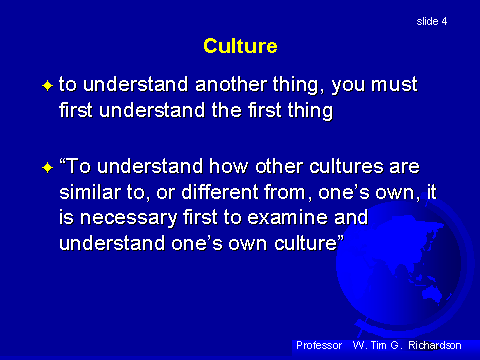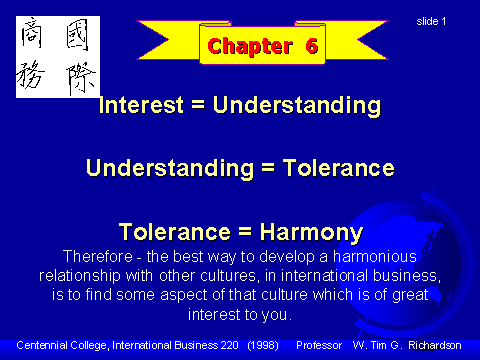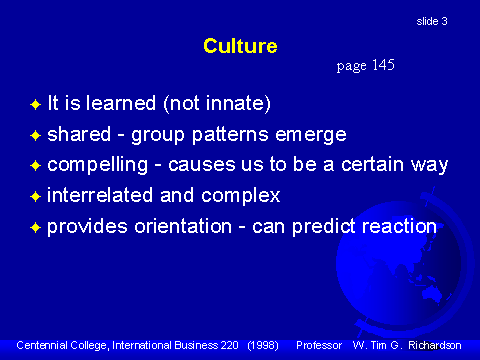Considerations

| Social
- Cultural
Considerations |
 |
 |
This web page has audio clips - just click on the icon (like the one to the left) and you can hear Prof. Richardson's voice adding additional information to topics on the page. |  |
turn on your speakers to hear audio clips |
| INTRODUCTION | In this section
of the course we will study the Cultural Forces. It is critical
to understand the effects of the cultural environment on International
Business.
Even if you do not have the resources to "know", in detail, each culture, you need to know the effects. "Because international business includes people from different cultures, every business ... is subject to cultural challenges" The cultural environment has influences on some of the other environments:
|
.
.
.
.
 |
screen shot from an old Powerpoint slide on Culture in Int'l Business |
Before you can understand Canadian Culture, you must first know what are some of the main points of Korean Culture?
What are the main points
of Korean Culture?
| Culture
and Nation Identity
|
Language is a Stabilizer
A common language can bring people together |
| What languages are most spoken in the world? | Which is the most popular
language in the world?
"Including alternate (second language) as well as primary (mother-tongue) speakers, two languages reached approximately one billion (1,000,000,000) speakers by the end of the 20th century. These are Putonghua or "Mandarin" Chinese, official language of the most populous nation on earth, and English, now the most widely used and studied language of the world. The title of "the most spoken language on earth" presently alternates between Chinese and English within each twenty-four hour cycle. When the sun is over the western Pacific, the most spoken language is Chinese. When the sun is over the Atlantic and China sleeps, the most spoken language is English." from www.linguasphere.org/language.html |
Don't use slang expression and metaphors when speaking English to non-English speakers - think carefully about your vocabulary and prepare simple words to explain jargon and slang that might be common in your business sector. If you say something is "a piece of cake", you might think it means easy, but a person using a foreign language-English dictionary might interpret this as meaning "a portion of a pastry". Canadians might not think we use a lot of slang, but as a result of our multi-cultural influences we do use many many slang expressions and metaphors. For example from the younger generation we have "my bad" to the older generations "beg your pardon". Also, keep in mind that we don't speak the same language across Canada, there are some regional accents that can be slightly difficult to understando slow down
click on the flagto hear an example of what I mean
So - part of being prepared is to look at the vocabulary in your marketing promotions material and think about the words in your presentations and consider substituting any phrases or terms that might be difficult for people to understand if they did not know the cultural references of some expressions.
o establish trust
this is one of those pieces of advice that is easy to say but difficult to explain "how to do" clearlyo understand importance of language
- the personal experience of Prof. Richardson has revealed two little things that can help establish trust in the very beginning
1. be precise and accurate about directions to a meeting location - make it easy to say after "See, right where I said it was, trust me"
2. be reliable and trustworthy about time - if the meetings start at a particular time, always be early, even if the culture of the host country is casual about time
some languages are very "old" and the saying of certain words carries a meaning far beyond the dictionary meaning - depending on the contexto respect the culture
- this means do not be too eager to say words in a new language unless your translator has advised you of the proper context and accompanying body language
"De gustibus non est disputandum" - Latin: About taste there is no argument"o understand surface culture and deep culture
- don't be overly-familiar - many cultures have quite formal rules for meetings, meals and conversations
- North Americans tend to be overly eager to touch other people and to address people without using titles and rank - this is uncomfortable to some culture, particularly some cultures in Asia
"Beyonce" recently (Oct 2007) made headlines when she decided NOT to do some concerts in Malaysia in response to Malaysia's restrictions on what performers can "reveal" in their clothing on stage. CBC reported that "Malaysian authorities are warning once again that music performers should follow strict government policies if they want to stage concerts". The Ministry introduced a "compulsory dress code and other rules for performers in 2005."
Entertainment is "big business" and "international business" and is an obvious situation where clashes in the "social-cultural environment" meet with rules and regulations of the "political environment"
some subjects are taboo, unless you are from that cultureo be sensitive to different body language and different meanings of gestures
- as a non-Japanese, it would be very difficult to phrase a question about Nagasaki or Hiroshima without offending someone in Japan, so don't
o keep the appropriate physical space/distance and eye contact in conversations
In some cultures, some parts of the body might be considered offensive if you touch them, or cause them to be shown. listen to an example
o understand that in each culture there may be strong differences based on
listen to an example
This list is a combination of some existing points from Traditional IB Textbooks + some additional recommendations based on the personal international travel experience of Prof. Richardson
|
|
 |
Powerpoint Presentation
on culture from
an old text -  |
 |

|
| Cultural
Forces |
.
Attitudes and Beliefs
Education
attitudes towards respect for government and authority figures |
|
|
CONTACT I MAIN PAGE I NEWS GALLERY I E-BIZ SHORTCUTS I INT'L BIZ SHORTCUTS I MKTG&BUSINESS SHORTCUTS I TEACHING SCHEDULE |
| . | |
| MISTAKES ITEXTS USED I IMAGES I RANK IDISCLAIMER I STUDENT CONTRIBUTORS I FORMER STUDENTS I | |
| . |